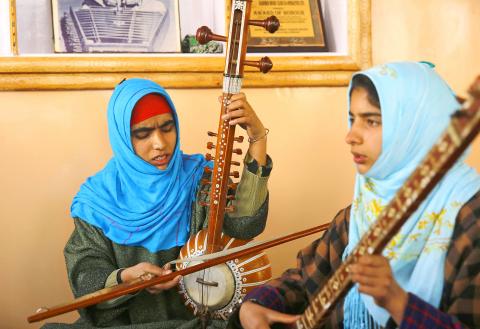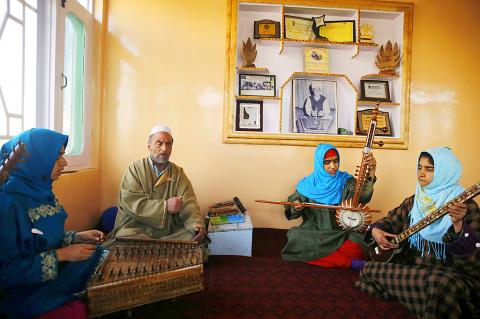When Kashmiri teenager Shabnam Bashir first took up classical Sufi music three years ago, she had to practice singing in secret because all the men in her Muslim family opposed her new passion.
Now the 14-year-old is a proud member of what her teacher Mohammad Yaqoob Sheikh says is the first mixed Sufi singing ensemble in Indian-administered Kashmir, where the music has for generations been a male preserve.
“It took me two months to convince them all,” said Bashir as she joins four other girls — and one 13-year-old boy — for singing practice.

Photo: Parvaiz Bukhari, AFP
“My father finally gave me permission on condition that it did not affect my regular studies.”
Thousands of people in the Muslim-majority region follow Sufism, a mystical branch of Islam whose adherents seek spiritual communion through music and dance at the shrines of their saints.
The songs, which use the lyrics of old Kashmiri and Persian-language devotional poetry, date back to the 15th century. But they have evolved as a uniquely male tradition, sung by men and handed down through the male line of the family.

Photo: Parvaiz Bukhari, AFP
Sheikh is the exception — he learned the art from his maternal grandfather, Ghulam Mohammad Qaleenbaf, one of the region’s best known Sufi singers.
“The earlier masters wouldn’t even pass it on to sons of their daughters, only sons or sons of sons,” Sheikh told AFP at his home in the outskirts of the main city of Srinagar.
Sheikh began teaching young Kashmiris in a bid to preserve the Sufi musical tradition of the picturesque Himalayan region, which has been divided between India and Pakistan since partition but is claimed by both countries.
He said young Kashmiris were turning away from classical music and towards protest rap songs inspired by the tense politics of the heavily militarized region, where dozens of protesters were killed last year in clashes with government forces.
“Teaching young boys and girls in a disciplined manner is the surest way to preserve this heritage,” said Sheikh.
But doing so has not been easy.
SAVING SUFIYANA
When he first started teaching girls, Sheikh faced opposition from both neighbors and soldiers, and had to move the classes to a new location four times.
“It looked like everything was going up in flames. I wanted to do something to save Sufiyana,” he said.
Now he has trained nearly 50 Kashmiri women — although only a small minority continue to perform after marriage.
Among his current students are teenagers Rehana Yousuf and her sister, who sit in a circle with their fellow musicians, heads covered in bright colourful scarves.
Yousuf plays the Santoor, a 100-stringed instrument that accompanies Sufi singing, and says she was inspired to learn when she first saw Sheikh perform on television.
“When I heard [Sheikh] teaches girls too, I developed a strong urge to learn,” she said.
“My father is also [Sheikh’s] student, and he was happy for me to come here.”
A curfew imposed last year following violent protests over the killing of a popular rebel leader meant classes had to stop for four months.
The situation has calmed since, but tensions are still running high in the territory, where many favor independence from India.
On the Pakistan side of the border, Sufi music is thriving thanks to a hybrid form known as Sufi Rock, in which the original lyrics are sung to electric guitar tracks and traditional tabla beats.
The form has seen a recent revival with the advent of Coke Studio, a television show which features live music performances. Female performers are among its biggest stars.
But over the years, political tensions have eroded Indian Kashmir’s rich musical heritage.
When an armed uprising against Indian rule broke out in 1989, public performances by artists suddenly stopped and cinema halls were closed and transformed into camps for government forces.
Once a feature of most public events, performances of Sufi music are now relatively rare.
Sheikh still goes wherever there is demand.
“Once in a while we go to perform in the homes of a few who still appreciate this music,” he said.
“For us, it’s like prayers, we cannot demand a price. They pay what they like,” Sheikh said.

May 26 to June 1 When the Qing Dynasty first took control over many parts of Taiwan in 1684, it roughly continued the Kingdom of Tungning’s administrative borders (see below), setting up one prefecture and three counties. The actual area of control covered today’s Chiayi, Tainan and Kaohsiung. The administrative center was in Taiwan Prefecture, in today’s Tainan. But as Han settlement expanded and due to rebellions and other international incidents, the administrative units became more complex. By the time Taiwan became a province of the Qing in 1887, there were three prefectures, eleven counties, three subprefectures and one directly-administered prefecture, with

Taiwan Power Co (Taipower, 台電) and the New Taipei City Government in May last year agreed to allow the activation of a spent fuel storage facility for the Jinshan Nuclear Power Plant in Shihmen District (石門). The deal ended eleven years of legal wrangling. According to the Taipower announcement, the city government engaged in repeated delays, failing to approve water and soil conservation plans. Taipower said at the time that plans for another dry storage facility for the Guosheng Nuclear Power Plant in New Taipei City’s Wanli District (萬里) remained stuck in legal limbo. Later that year an agreement was reached

What does the Taiwan People’s Party (TPP) in the Huang Kuo-chang (黃國昌) era stand for? What sets it apart from their allies, the Chinese Nationalist Party (KMT)? With some shifts in tone and emphasis, the KMT’s stances have not changed significantly since the late 2000s and the era of former president Ma Ying-jeou (馬英九). The Democratic Progressive Party’s (DPP) current platform formed in the mid-2010s under the guidance of Tsai Ing-wen (蔡英文), and current President William Lai (賴清德) campaigned on continuity. Though their ideological stances may be a bit stale, they have the advantage of being broadly understood by the voters.

In a high-rise office building in Taipei’s government district, the primary agency for maintaining links to Thailand’s 108 Yunnan villages — which are home to a population of around 200,000 descendants of the Chinese Nationalist Party (KMT) armies stranded in Thailand following the Chinese Civil War — is the Overseas Community Affairs Council (OCAC). Established in China in 1926, the OCAC was born of a mandate to support Chinese education, culture and economic development in far flung Chinese diaspora communities, which, especially in southeast Asia, had underwritten the military insurgencies against the Qing Dynasty that led to the founding of